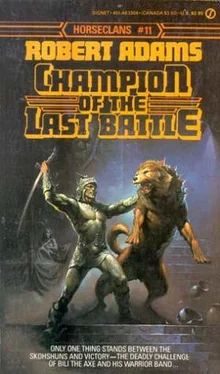Colonel Potter smirked. “Mercenary, hey? How much do you think he’d cost us to say ... leave a gate open one dark night?”
Sir Djahn shrugged. “I got to know him rather well, colonel, and I doubt me he could be bought for any price, not with his word already pledged to King Byruhn.”
Potter laughed. “Come, come, Sir Djahn, every mercenary has a price; for that matter, every man has a price.”
The herald eyed his questioner coldly and asked, “Is it so, colonel? Then what, pray tell, is your own price?”
“Now damn your eyes, Sir Djahn!” Potter’s chair crashed over as he came to his feet, his hand seeking the hilt of the sword he was not wearing just then, his features beet-red and working in rage.
The brigadier’s broad, callused palm slapped the table explosively. “Damn your eyes, Colonel Potter! Sit down and hold your tongue. Sit down, sirrah!”
Sulkily, Potter righted his chair and resumed his seat, staring malevolently from beneath his brows at Sir Djahn, but remaining silent, as ordered.
The brigadier nodded. “Now, let us continue the debriefing, gentlemen, if you so please.” He looked to Senior Colonel Sir Djaimz.
That officer asked, “All right, Sir Djahn, give us a thumbnail sketch of this Duke of Morguhn and the general command structure within the garrison of New Kuhmbuhluhnburk. How many of the nobles were disaffected by this condottiere being placed over them?”
“None, it would appear, Sir Djaimz. This Bili of Morguhn seems to be a universally popular officer and man. As regards my impressions of him, well ... he is above average height, though not so tall or heavily built as the king—six foot two or three, I’d venture to say, somewhere between fifteen and seventeen stone weight—a thick-bodied man, though not fat, nor in any way clumsy of movements.
“He wears the Order of the Blue Bear of Harzburk, and his accent, too, is of the Middle Kingdoms, though his duchy seems to lie in the Ehleen Confederation. How he and his condotta came to fight for New Kuhmbuhluhn, I have no idea, but it seems that this is the second year of their contract. Last year they served in the southerly reaches of the kingdom, I was told, against some primitive savages called Ganiks.”
The old brigadier nodded again. “Oh, yes, the cannibals. I’ve heard legends of how the ancestors of the modern-day Ohyohers drove that tribe across the river, years agone. But go on, Sir Djahn.”
“Bili of Morguhn looks quite young, but I doubt me not that that look is deceiving, for he is obviously a trained and vastly experienced warrior and leader, both in fieldwork and in siegecraft. He seems well along in the task of welding the garrison of the burk into as well-run and efficient a force as his own, small condotta.”
“Thank you, Sir Djahn,” said Sir Djaimz. “Now, this garrison, what numbers are we facing, what are they armed with?”
“As might be expected, polearms, mostly reworked and rehafted agricultural implements from the looks of them, though some fair number are weapons made as such to begin, too. From the appearances, every able-bodied man in the city is being drilled in the use of those polearms, that or given lessons in the operation of crossbows and staff slings.”
“A citizen levy, yes, that’s routine, expected, in any threatened city,” said the brigadier. “But what of trained bands, full-time troops? How many in this condotta, eh?”
“About two hundred, Sir Ahrthur, perhaps a quarter of those either hornbow archers or expert dartmen. The royal footguards number some five score and are armed with short pikes and poleaxes. There are the New Kuhmbuhluhn nobility, of course, though not so many as I would have expected; I am told that their battle casualties were quite heavy, which you can believe or not, as you will. Two thousand horsemen could have beenhidden in the warren they’ve made of that mountain and I’d never have known it. But it would seem that while the walls will be well manned, few of those manning them will be much experienced.”
Behkah, though she of course yearned to be back with her man, was of the opinion that she might have fared much worse than she had since these Skohshuns had captured her, wounded and helpless, on the battlefield. Once recovered of her hurts, she had been kept fettered and under day—and-night guard in one small tent, while the captured Kuhmbuhluhners were housed in another close by. But she had been adequately fed, visited daily by one of the surgeons and encouraged to walk under guard as much as she wished. But she had not been raped yet, or afforded any ill treatment, save by a white-haired old man who had slapped her face a few times before her act had convinced him that she did not speak any Mehrikan at all.
Nor did her fellow captives seem to have been ill used in any way, though of course she could not speak to them, not without giving away her linguistic deception.
She had heard her guards discussing the possibility of captives who had been taken earlier being brought to the encampment and housed with her and the rest, but that had not come to pass by the time the entire Skohshun army—prisoners included—took to the road and marched on New Kuhmbuhluhnburk.
As amazed as Behkah had been at the neatness and orderliness of the first encampment she had seen of these Skohshuns, she was no less amazed at how fast the encampment before the walls of New Kuhmbuhluhnburk went up. Within less than one full day, the fosse was dug out, the rampart raised and the tents pitched in serried rows, the prison tents too, near to the center of the rectangular camp.
The prison routine recommenced for her and the others, and on her walks about the bustling encampment, she often looked up at the burk, straining her eyes vainly, wondering if one of those tiny figures on the battlements of the walls was her dear Frehd, wondering if ever he thought of her or if he now mourned her as dead.
On the march and here in this new camp the Skohshuns had not borne their heavy, unwieldy, overlong pikes; rather had they been carried, in bundles of several hundred and carefully wrapped against rain or dampness, in long, narrow, stake-bed carts. Officers and pikemen alike all wore their swords and dirks, naturally, but unless going out to forage, few bore polearms of any description, she noted, though stacks of them were scattered about ready to hand when and if needed. Nor, with the exception of helmets, was armor much in evidence, again save that worn by woodcutters and foragers leaving the encampment.
After the first few days, Behkah gave over trying to keep count of the numbers of felled trees dragged across the plain and into camp by teams of horses, mules and huge plodding oxen. Once topped, tall, straight trunks were set deeply into the packed earth inside the fosse, just far enough apart to force an attacker to squeeze through sideways; short or crooked trunks were quickly rendered into faggots for the cooking or watch fires, or shaped into double-pointed stakes and set into the floor of the fosse to impede attackers.
Nor were even the smallest branches allowed to go to waste, she noted wonderingly. Of the nights, with little or no light, the skillful fingers of pikemen wove them into latticework fences to enclose the horse lines, officers’ tents and latrines, even one for the area around the tents of the prisoners. They also fashioned smaller-mesh frames to hold conifer tops and tips over which to spread their cloaks or blankets. She and the other prisoners were provided with these camp beds, as well.
Then, early one morning, still another foraging party set out with their wagons, but it was not yet midday when they returned, all wreathed in happy smiles, three of the wagons creaking under, the teams groaning with the weight of, barrel after barrel of some liquid, all of which were off-loaded at the supply area.
Читать дальше












